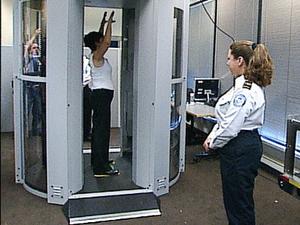Aviation securityTSA retests body scanners amidst radiation exposure concerns
The Transportation Security Administration (TSA) recently announced that it was retesting all of its full-body scanners over concerns that they were emitting high levels of radiation; maintenance records have shown that some scanners emitted radiation levels ten times higher than expected; TSA says that these increased levels were simply the result of a math mistake and that the machines do not pose a health risk; one type of body scanner in use relies on backscatter X-rays which produce very low levels of ionizing radiation; experts worry about the long-term effects of repeated exposure at low levels

Questions raised about higher levels of radiation // Source: obrag.org
The Transportation Security Administration (TSA) recently announced that it was retesting all of its full-body scanners currently in use in airports across the United States over concerns that they were emitting high levels of radiation.
While TSA maintains that the machines are safe, lawmakers are growing increasingly concerned about radiation. In particular, maintenance records have shown that some scanners emitted radiation levels ten times higher than expected. TSA says that these increased levels were simply the result of a math mistake and that the machines do not pose a health risk.
According to the U.K. Health Protection Agency, the amount of radiation a person is exposed to is roughly the same amount of radiation a person would experience from the sun’s cosmic rays if they flew for fifteen seconds on an airplane at 35,000 feet.
David Brenner, director for the Center for Radiological Research at Columbia University Medical Center, says that while the radiation levels are very low, people should be concerned about repeated exposure over the long term.
“The risks for any individual going through the X-ray backscatter scanners are exceedingly small. However, if all air travellers are going to be screened this way, then we need to be concerned that some of these billion people may eventually develop cancer as a result of the radiation exposure from the X-ray scanners,” Dr. Brenner said.
He adds, “As someone who travels just occasionally, I would have no hesitation in going through the X-ray backscatter scanner. Super frequent fliers or airline personnel, who might go through the machine several hundred times each year, might wish to opt for pat-downs. The more scans you have, the more your risks may go up-but the individual risks are always going to be very, very small.”
Nicholas Kimball, a spokesman for TSA, says that the agency will conduct tests out of “an abundance of caution to re-assure the public” that the machines are completely safe.
The agency will complete the assessment in thirty days and post its findings online.
